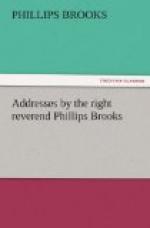thinks of every change that is to come to him as in
the nature of denial of something that he is at the
present doing and being, as the laying hold upon himself
of some sort of restraint, bringing to him something
which says: “I must not do the thing which
I am doing. I must lay upon myself restraints,
restrictions, commandments, and prohibitions.
I must not let myself be the man that I am.”
You see how the Old Testament comes before the New
Testament, the law ringing from the mountain top with
the great denials, the great prohibitions, that come
from the mouth of God. “Thou shalt not
do this, that, or the other—Thou shalt not
murder. Thou shalt not steal. Thou shalt
not commit adultery. Thou shalt not covet thy
neighbor’s goods.” That is the first
conception which comes to a man of the way in which
he is to enter upon a new life, of the way in which
the denial in his experience is to take effect.
It is as if the hands were stretched out in order
that fetters might be placed upon them. The man
says, “Let some power come that is to hinder
me from being this thing that I am.” And
the whole notion is the notion of imprisonment, restraint
So it is with all civilization. It is perfectly
possible for us to represent civilization as compared
with barbarism, as accepted by mankind, as a great
mass of restrictions and prohibitions that have been
laid upon human life, so that the freedom of life has
been cast aside, and man has entered into restricted,
restrained, and imprisoned condition. So it is
with every fulfilment of life. It is possible
for a man always to represent it to himself as if it
were the restriction, restraint, and prohibition of
his life. The man passes onward into the fuller
life which belongs to a man. He merges his selfishness
into that richer life which is offered to human kind.
He makes himself, instead of a single, selfish man,
a man of family; and it is easy enough to consider
that marriage and the family life bring immediately
restraints and prohibitions. The man may not have
the freedom which he used to have. So all development
of education, in the first place, offers itself to
man, or seems to offer itself to man, as prohibition
and imprisonment and restraint. There is no doubt
truth in such an idea. We never lose sight of
it. No other richer and fuller idea which we
come to by and by ever does away with the thought that
man’s advance means prohibition and self-denial,
that in order that man shall become the greater thing
he must cease to be the poorer and smaller thing he
has been. But yet there is immediately a greater
and fuller. When we hear those words of Jesus,
we see immediately that not the idea of imprisonment
but the idea of liberty, not the idea of restraint
but that of setting free, is the idea which is really
in His mind when he offers the fullest life to human
kind. Have you often thought of how the whole
Bible is a Book of Liberty, of how It rings with liberty
from beginning to end, of how the great men are the




